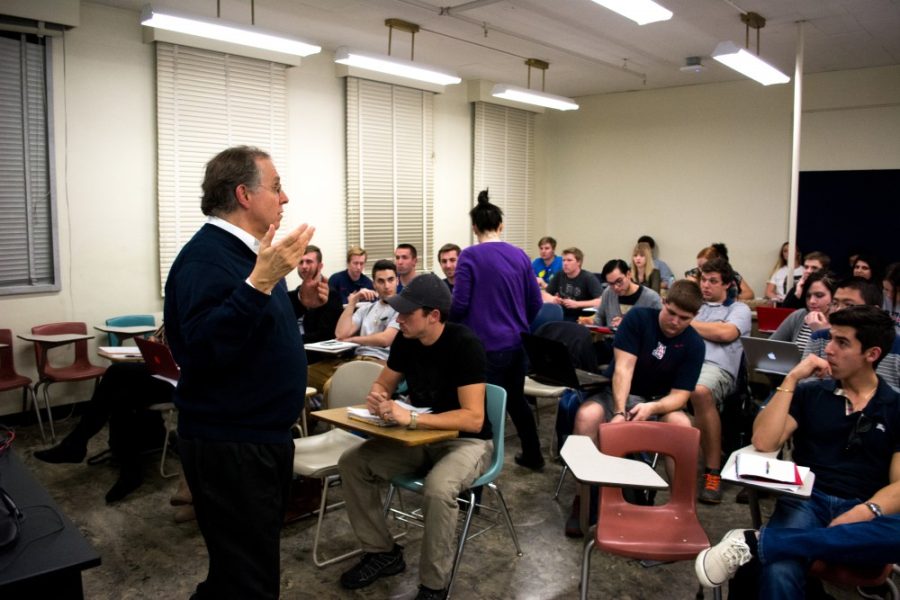Thursday night set records for the Graduate and Professional Student Council’s Achievement Awards ceremony.
GPSC received more than 120 nominations for the six achievement awards, an increase of more than 40 from last year. The Achievement Awards had six categories for faculty, staff, and graduate and professional students from GPSC.
Winners received $100 and honorable mentions earned $50.
The nominees had to fit a general award description that included making unique efforts to recognize others’ achievements, raising awareness of under-represented groups, and working to diversify the UA campus and build community.
First-place winner of the Outstanding Mentor of Graduate/Professional Students Award was Young-Jun Son, a professor in the College of Engineering. Honorable mention went to David Schmidtz, associate director of Rural Family Medicine at the Center for Rural Health.
Nominated faculty members had to have created opportunities for graduate or professional students, faculty and staff, assisted students in presenting and publishing their work, helped students find financial aid and provided career guidance.
“I am just honored. I feel I have been so fortunate to have such a good group of students,” Son said. “I couldn’t do any of this work without the great students. That really means a lot [to me to be nominated]. It’s hard to express.”
First-place winner for the Outstanding Graduate/Professional Student Leadership Award was Jessie Finch, a sociology graduate student; honorable mention was Ashley Stinnett, an anthropology and media arts graduate student. Judges were looking for someone who demonstrated “leadership in a co-curricular endeavor,” has contributed to their program or organization and has had a positive impact on the UA community.
“[I’m] really excited. I think that it was amazing that there were so many nominees this year,” Finch said. “It’s really great to be recognized among such a large group of esteemed peers.”
First-place winner for the Outstanding Interdisciplinary Development by a Graduate/Professional Student Award was April Petillo, a graduate student studying American Indian studies. She won the award for demonstrating creativity and innovation and having the potential to make a significant contribution in her field, according to the award criteria. There was no honorable mention for this category.
“I’m a little surprised, but very pleased actually,” Petillo said. “My original department [is] American Indian studies, and I really do try to make an effort to be in touch with the Department of Sociology and Department of Gender and Women’s studies. It’s pretty awesome to be recognized for that.”
The winner of the Outstanding Program Coordinator Award, Maria Telles, was chosen for being accessible to graduate students, helping them become follow the regulations governing graduate degrees and preventing and resolving student problems, according to the criteria. Telles is the program coordinator for Confluence Center. Honorable mention for the award went to Linda Koski, senior program coordinator in the School of Geography and Development.
“It’s a great honor to be in this university. I think the greatest asset here are the people, including the students,” Telles said. “I feel that everybody else deserves this. It’s not me that deserves this, because the work that I do is the work that others do to help me.”
Jennifer Mortensen, a family and consumer sciences graduate student, won the Outstanding Research Assistant Award. Honorable mention was awarded to Christina Williams. Mortensen exhibited originality and imagination, outstanding contributions to research, and research mentoring to peers and/or undergraduates to win the award, according to the award requirement description.
First place for the Outstanding Teaching Assistant Award went to Mahmoud Azaz, a graduate student studying second language acquisition and teaching and Middle East and North African studies. Honorable mention was given to Jesse Minor, a geography and natural resources graduate student. To earn the award, Azaz demonstrated outstanding teaching practice, inspired student learning and showed continued improvement of his teaching practice, as outlined in the award criteria.
“I can thank the people who nominated me,” Azaz said. “For sure this is some kind of motivation for me to do better and to have other students in the Arabic program to do more.”








